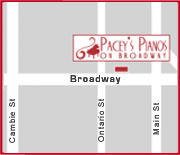Piano Tuning
About Piano Tunings
As any piano player understands, the fine details of the piano determines the feel and sound of the instrument, but that is what makes the piano such a beautiful instrument. All pianos require tuning in order to keep them sounding the best that they can, and tuning a piano is as much art as it is science. It requires a special touch, some advanced tools, and an exceptionally fine ear. Our technicians have the latest technology and a thorough understanding of the inner workings of pianos.
Changes in temperature and weather are the primary cause of pianos going out of tune and needing maintenance. Moisture and heating affect the sound board, and changes in temperature cause the pins and strings to move ever so slightly, but enough to change the sound.
Pianos need to be tuned after moving, less because they have been shaken and bounced around than that they are in different environments. They are incredibly resilient but need to be touched up whenever there is a climactic change.
The more intensely and harder you play the faster it will go out of tune. The force of the keys and hammers moving cause the tension in the strings to lose equalization. Tuning will return the balance to strings and keys.
The indirect benefit of tuning your piano regularly is if a problem is found, it can be fixed quickly and can help prevent your investment from greater and more extensive damage.
How Often Should I Tune My Piano?
As a general rule, pianos should be tuned twice each year. However you should have your piano tuned as often as you feel it is needed. Concert pianos are tuned before every performance and recording studios have their pianos tuned every couple of days.
You should tune your piano after it is moved, about two weeks after you turn the heat on in the winter and two weeks after you turn it off in the spring.
A piano that is primarily a piece of furniture can go a whole year between tunings and a heavily used one should have it done quarterly.
Did You Know?
1. Regular Piano Tunings Can Prevent Serious Damage:
Pianos are complex instruments. If one part of your piano performs sub-par, then the overall quality of the instrument suffers. Bad tuning can be a symptom of another problem, and out-of-tune strings can be indicators that you are in need of an overall tune-up.
2. Your In-Home Piano Tuner Will Inform You of Problems:
Some issues are undetectable by players, so having a qualified professional looking around inside your piano on a regular basis can prevent small problems becoming major concerns. Our Piano Tuners are trained to handle any and all piano maintenance.
3. The More You Tune, The Less You Have To:
Regular piano tunings help strengthen your piano. After a few regular tunings, you will notice that the pitch doesn’t stray as easily or as often as it did before. Ideally, you should have four tunings per year.
4. Regular Piano Tunings Save You Money:
If your piano goes two or more years without a professional tuning, it may require corrective treatments, which will be added cost to your bill.
What Do Manufacturers Say About Piano Tuning?
Steinway & Sons
“… no matter how expertly a piano is tuned, atmospheric variations and the nature of the piano’s construction constantly conspire to bring it off pitch.”
Yamaha
“… A piano should be tuned at least twice a year.”
“Complete piano service should include periodic regulation and voicing in addition to tuning…”
Baldwin Piano Company
“After the first year, a piano should be tuned at least twice each year thereafter…”
(c) 2024 Pacey's Pianos. All rights reserved.

